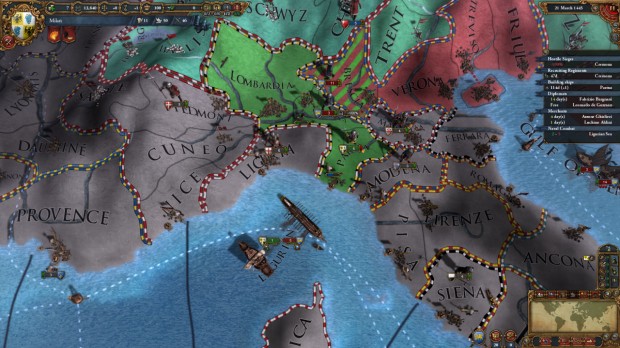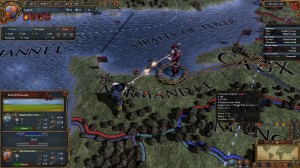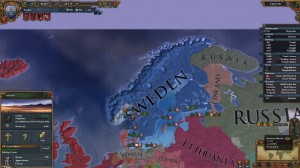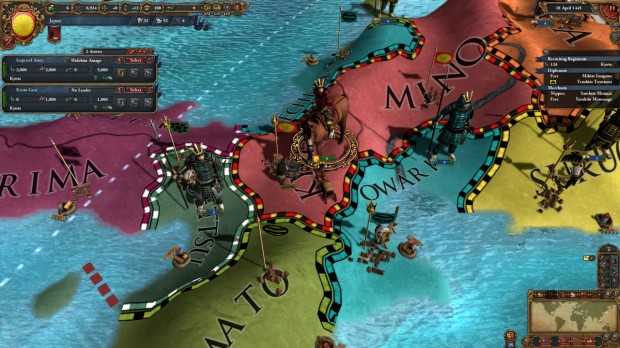Europa Universalis IV Hands-On Preview
- Updated: 28th May, 2013
Paradox Development Studios have arranged an enormous multiplayer preview event for Europa Universalis IV and they’ve given each attendee control of one nation during the renaissance era. I would say that they’ve given me control of Sweden, but for the fact that I find that, at this point in history, Sweden isn’t entirely in control of itself.
Instead, I’m in what’s called a “personal union” with Denmark, in which their ruler makes all the important diplomatic decisions for me: military pacts, declarations of war, whether we serve Ferrero Rocher at receptions and so on. I’m left to tend things within my own borders, muttering away to myself as I manage trade routes and try to force the Finns in my land to speak Swedish. I wouldn’t mind a little more autonomy. Actually, I’d like a lot more of it, though for now I’ll have to wait and I already have plenty on my plate.
As well as balancing my books, shuffling my armies about and constructing a host of improvements, I’m trying to make my country much smarter than its neighbours. If I can’t look outward, I’m certainly going to look inward.
This is how things start should you choose to be Sweden in the fourth game in this grand strategy series. This is no Civilization, where every nation begins from scratch. Europa Universalis IV is all about asymmetry, starting you off at a point in history where some nations are large and sprawling, while others are weak and subservient and others still have the possibility for greatness ahead of them. Modest Portugal stares out at the Atlantic, across which a whole continent awaits their opportunistic explorers, and even the smallest countries have a lot to keep them busy.
Starting in the renaissance era means that the world is poised to discover new ideas, new lands and even new technologies. Europa Universalis IV has a real sense of pace to it as you quickly realise that, as well as whatever petty land-grabs your neighbours might be involved in, much more is at stake. Using merchants to control trade routes becomes vital for raising funds, while employing capable advisors who will advance your research is essential for if you want advantages in both peacetime and on the battlefield.
 You find you’re you’re constantly watching three power scores: administrative, diplomatic and military. While points from these ever-growing scores can be invested in discovering new technologies, you find you’re constantly spending them to helping you get through day-to-day tasks, from quelling revolts to negotiations to stabilising your nation. National progress is a balance between aiming for the future and simply managing the present, a series of tough choices that are plenty of food for thought.
You find you’re you’re constantly watching three power scores: administrative, diplomatic and military. While points from these ever-growing scores can be invested in discovering new technologies, you find you’re constantly spending them to helping you get through day-to-day tasks, from quelling revolts to negotiations to stabilising your nation. National progress is a balance between aiming for the future and simply managing the present, a series of tough choices that are plenty of food for thought.
While the Europa Universalis series has never been as big as Civilization, it’s become popular with gamers who’ve enjoyed losing themselves in more complex mechanics, more detailed economies and the slower pace of play. Those gamers didn’t include me, because I was only ever getting lost amongst the labyrinthine menus, often unable to grasp exactly which of my decisions were tied to which outcomes. Not this time.
 The latest in the series had me raising an eyebrow in pleasant surprise. While it’s still very much a complicated, slow-burning and sometimes unforgiving game, Paradox have been spending a lot of time on the interface and on trying to create something that is much more accessible. Europa Universalis IV is still a beast of a thing, but it’s developing into a far more transparent and manageable experience. It’s much easier to find the information you want and to make the choices that you need to.
The latest in the series had me raising an eyebrow in pleasant surprise. While it’s still very much a complicated, slow-burning and sometimes unforgiving game, Paradox have been spending a lot of time on the interface and on trying to create something that is much more accessible. Europa Universalis IV is still a beast of a thing, but it’s developing into a far more transparent and manageable experience. It’s much easier to find the information you want and to make the choices that you need to.
This meant I spent a lot less time wondering how I could do what I wanted to and a lot more time doing it. Armies were recruited, trade routes were connected and diplomats shipped to distant shores. It helps that, as in Paradox’s other grand strategy games (the Crusader Kings and Victoria series), Europa Universalis IV is played out in real-time, but the action can be paused, sped up, or slowed down. You can play the game at exactly the pace you need to, depending upon how much input your nation might need.
 And then there’s that multiplayer. Paradox have never really pitched their grand strategy games as multiplayer titles but, after our lengthy session it’s apparent that this is a fascinating prospect. If the developer can iron out a few bugs, Europa Universalis IV could become an enormously involving multiplayer experience for those willing to commit the time. Dynasties rise and fall, while borders flow like liquid. My Sweden broke free, expanded into Norway and grew tiny Swedish colonies in North America, while those playing around me each had their own national tales to tell, usually very different to the true course of history.
And then there’s that multiplayer. Paradox have never really pitched their grand strategy games as multiplayer titles but, after our lengthy session it’s apparent that this is a fascinating prospect. If the developer can iron out a few bugs, Europa Universalis IV could become an enormously involving multiplayer experience for those willing to commit the time. Dynasties rise and fall, while borders flow like liquid. My Sweden broke free, expanded into Norway and grew tiny Swedish colonies in North America, while those playing around me each had their own national tales to tell, usually very different to the true course of history.
Europa Universalis IV could well follow the surprise success of Crusader Kings II, giving Paradox a deep, complex and yet far more accessible strategy game than those that have come before. It’s certainly one to watch out for.


Pingback: Marc Bloch Reviews Historical Games » Weekend News: Civ V, TW: Rome 2, EU IV